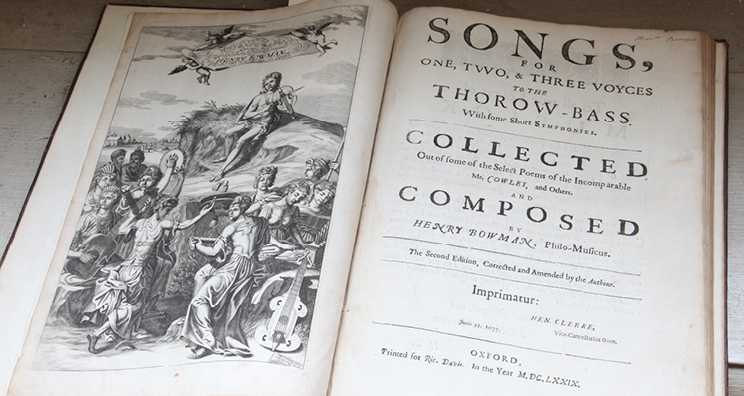Music
More than 550 volumes of music comprise the Montagu Music Collection at Boughton. They record over two and half centuries of musical tastes and reflect the changing styles and patterns of use of music both publicly and in the home from the 16th to the early 19th centuries.
Many of the volumes contain highly sophisticated calligraphy, true masterpieces of the art of printing and visually beautiful in their own right even before we consider the musical content. Some of the Italian madrigal volumes from the 1590’s are still in pristine condition. Others, like the Tudor lute manuals, are well thumbed. The earliest work in the collection is a set of French part songs by the Flemish composer Lassus, printed by Thomas Vautrollier, a French Huguenot refugee. This unique volume is dated 1570 and is one of the first pieces of music ever printed in England.
As Charles II’s ambassador to Louis XIV, Ralph 1st Duke of Montagu, must have attended many musical entertainments at the French court. His time there is echoed by a pair of operas by Lully in their first edition and by the French dancers and dancing masters employed by him and his son John who contributed enormously to the establishing of a new tradition of dance in England. The collection holds books of choreographic notation in the system developed by Louis XIV’s dancing master Pierre Beauchamp and used by the Duke’s dancing master Mr L’Abbé. The wide ranging dance catalogue contains volumes from both court and folk traditions and detailed eye-witness accounts of later 18th century ballet choreographies.
The 2nd Duke was equally passionate about music. By 1720 Handel was firmly established in London and when he managed to start his own opera company, John Montagu was one of his first core subscribers. The collection has around 55 Handel operas and oratorios, many in first edition, and several hundred arrangements for harpsichord of favourite Handel arias to be enjoyed at home. As Master of the Ordnance Duke John was responsible for commissioning from Handel one of the most famous pieces of the 18th century. King George II wanted a major public celebration to mark the Treaty of Aix la Chapelle, which brought to an end many years of conflict in Europe. Handel delivered the Music For the Royal Fireworks in 1749.
Duke John’s eldest son, Lord Monthermer, left for an extended Grand Tour in the 1750’s and his portrait by Batoni shows him holding a Corelli violin sonata and a small guitar. Like many grand tourists he went to the opera in Naples, Rome and Florence and brought back scores as souvenirs. But it was his sister, Elizabeth Montagu, who was the family’s great music enthusiast. She was given her first piano in 1770 and throughout her life steadily collected music scores. Although her large keyboard section mirrors the historic transition from harpsichord to pianoforte, her main passion was musical theatre and her vast, pioneering collection represents the genesis of the West End musical as we know it today. In the wake of Handel, a whole new school of English composers had emerged and supplied entertainment on a nightly basis in London’s burgeoning theatre land. Elizabeth bought the piano scores of almost everything she heard, with the result that we have 85 English operas and musicals to study, and many dozens of works by the most famous continental composers of the day.
As a keen collector, she acquired many anthologies and her Scottish music includes over 2,500 Highland melodies handwritten in the mid 18th century, and romantic anthologies of songs marking private Buccleuch family occasions. Elizabeth Montagu, Duchess of Buccleuch and Queensberry, is last sighted in her regular box at the Kings Theatre attending the London premières of Mozart and Rossini operas in the late 1810’s. She had unwittingly created one of the great music collections, a rare window onto the musical enthusiasms of her day.





